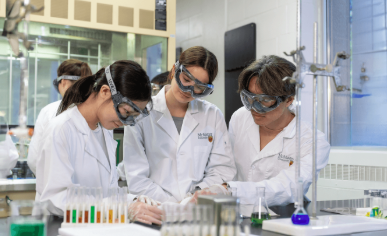High school students today are presented with more opportunities than ever to engage in advanced science research. These programs, offered by universities, research institutes, and even high schools themselves, allow students to explore scientific fields deeply, conduct hands-on experiments, and contribute to the world of scientific discovery. For many students, participating in these programs is more than just an academic experience—it is a chance to shape their future careers and make meaningful contributions to society.
The Importance of Science Research in High School
Engaging in science research during high school offers a variety of benefits that go far beyond mastering textbook knowledge. First and foremost, these programs help students develop critical thinking, problem-solving skills, and an understanding of the scientific method. By working on real-world problems and using advanced tools and techniques, students learn to approach challenges with curiosity, perseverance, and innovation.
The ability to conduct independent research also allows students to go beyond the confines of classroom learning. They have the opportunity to investigate subjects they are passionate about—whether that’s studying the genetics of a rare disease, researching renewable energy solutions, or exploring breakthroughs in artificial intelligence. High school research programs provide a platform for students to explore these interests in-depth and to pursue innovative ideas that could one day shape the future of science and technology.
Prominent High School Science Research Programs
There are a number of renowned science research programs available to high school students, offering them the opportunity to work alongside university researchers, scientists, and professionals in the field. Some of the most prestigious programs include:
Intel International Science and Engineering Fair (ISEF): One of the largest and most respected science fairs globally, ISEF provides a platform for high school students to present their research on a global stage. Students from around the world come together to showcase their projects, ranging from biology and chemistry to engineering and computer science. ISEF offers not only exposure to the scientific community but also scholarships and college admissions advantages.
Research Science Institute (RSI): Hosted at the Massachusetts Institute of Technology (MIT), RSI offers students the chance to work on cutting-edge research projects across various scientific disciplines. Students in this program conduct research alongside MIT faculty members, gaining invaluable experience and mentorship.
The Society for Science and the Public: This organization supports numerous programs aimed at engaging high school students in scientific inquiry. Their initiatives, such as Science News in High Schools and local science fairs, encourage students to pursue research projects and connect with the scientific community.
These programs are highly competitive and offer students the chance to develop their scientific abilities while gaining recognition and opportunities for future academic and career paths.
How to Get Involved in Science Research
Getting involved in advanced science research requires initiative and curiosity. For many students, the journey begins with identifying a subject that sparks their interest. This could be an aspect of biology, environmental science, physics, or even a more specialized field like robotics or neuroscience. Once a research area is chosen, students should seek guidance from mentors—whether that’s a science teacher, a local university professor, or even an experienced peer.
Students can also look for research opportunities within their own schools. Many high schools have science clubs or research teams that focus on independent projects or participate in local science fairs. Additionally, some schools partner with universities or research institutions to provide students with internships or opportunities to conduct research in real-world settings.
By taking the initiative to pursue these opportunities, students not only enhance their scientific understanding but also build valuable skills that will serve them in future academic endeavors.
Benefits of Advanced Science Research for High School Students
There are numerous benefits to participating in advanced science research programs:
Skill Development: Students refine a variety of essential skills, such as critical thinking, problem-solving, and data analysis. They also gain experience in scientific writing, public speaking, and presenting their findings, which are valuable in both academic and professional settings.
Enhancement of College Applications: Participation in research programs helps set students apart in the competitive college admissions process. Successful research projects demonstrate intellectual curiosity, initiative, and the ability to work independently—traits that are highly valued by top universities.
Career Exploration: Early exposure to science research allows students to explore potential careers in science, technology, engineering, and mathematics (STEM) fields. By working on hands-on projects, students gain a clearer understanding of which scientific disciplines they find most fascinating, helping them make more informed decisions about their future careers.
Networking and Mentorship: Science research programs often provide students with opportunities to connect with professionals, researchers, and peers who share their interests. These relationships can lead to future collaborations, internships, and job opportunities, providing a strong foundation for future career development.
Global Impact: Research conducted by high school students often addresses some of the most pressing issues facing society, such as climate change, health crises, and technological innovation. Students have the opportunity to make meaningful contributions to global challenges, giving them a sense of purpose and accomplishment.
Conclusion: Shaping the Future of Science
High school science research programs offer a unique and valuable opportunity for students to explore their passions, develop key skills, and contribute to groundbreaking discoveries. These programs not only prepare students for successful college careers but also inspire them to become the next generation of scientists, engineers, and innovators. As students engage with cutting-edge technology and collaborate with experts in the field, they are laying the groundwork for a future filled with new ideas and discoveries that could change the world.
By nurturing curiosity and fostering creativity, high school science research programs play a vital role in shaping the future of scientific advancement. Whether it’s investigating new ways to combat diseases, discovering sustainable energy solutions, or developing innovative technologies, students today are already making a difference—and tomorrow’s breakthroughs may just start in the high school science lab.














